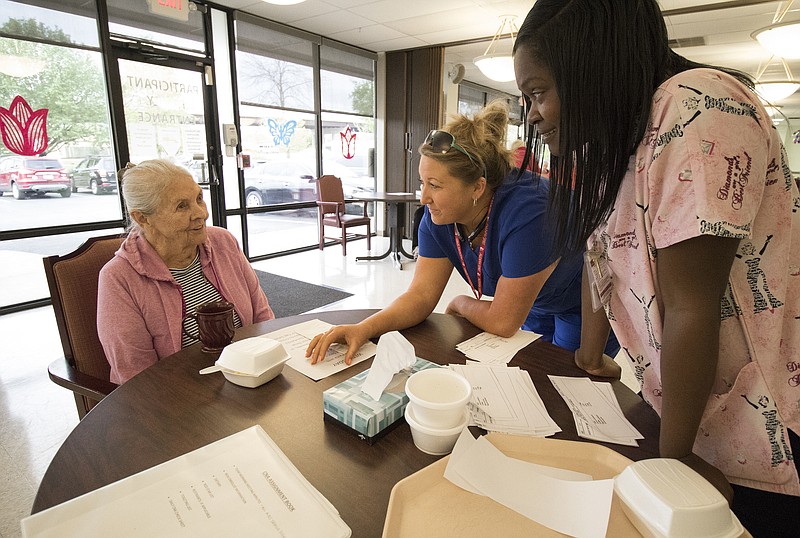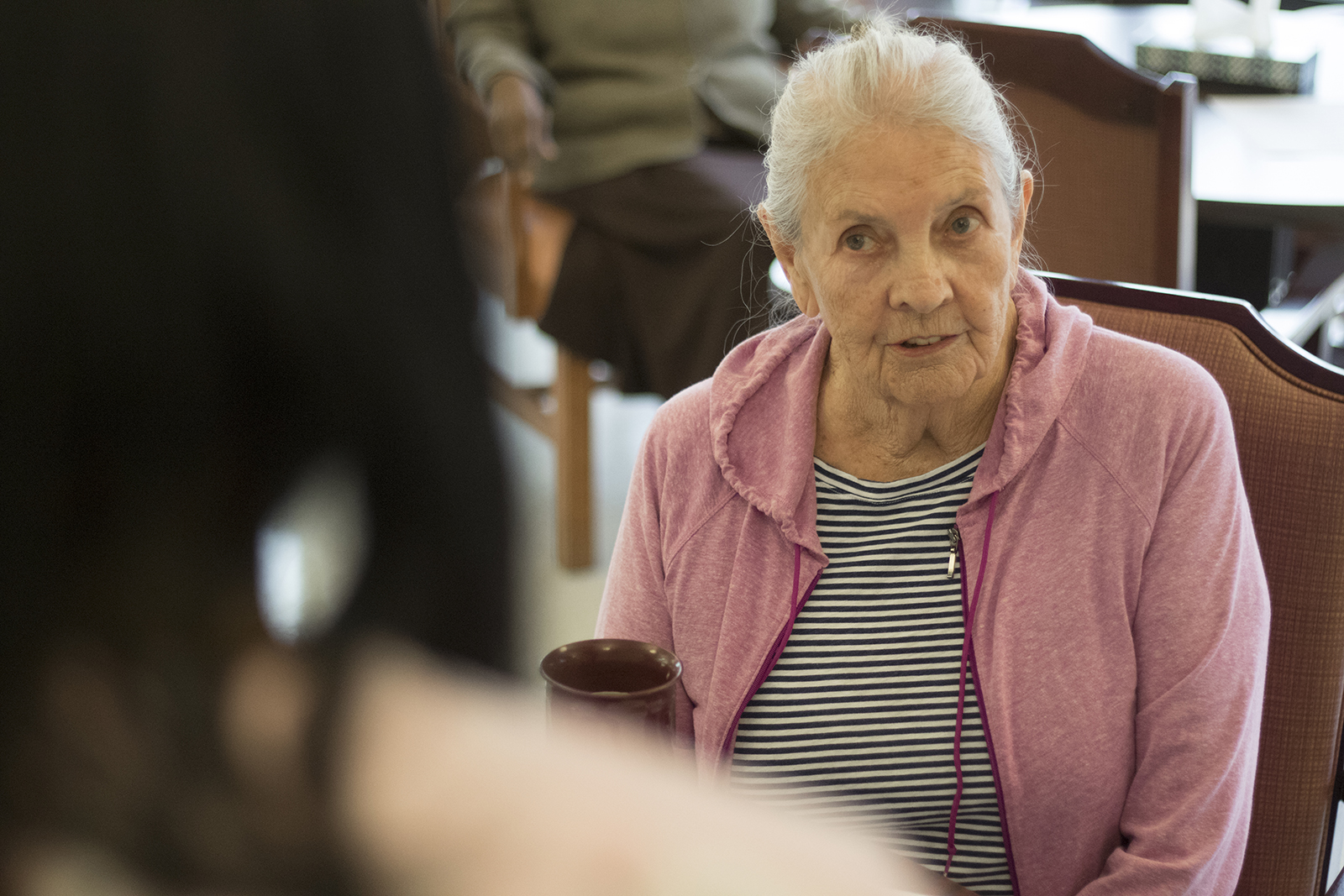Every morning, often before the sun rises, white vans bearing the Alexian Brothers logos begin arriving at the former strip shopping center-turned-senior care complex.
On a typical day, more than 50 often frail seniors are helped into the vans and transported to Alexian's facility off of 3rd Street for breakfast, lunch, medical care and recreation and social time. At the same time, other home health care aides visit many program participants to provide assistance in their homes.
The Program of All-Inclusive Care for the Elderly, or PACE, has helped hundreds of local seniors to continue living in their homes rather than move into a nursing home. The program, which began in 1999 and is now Tennessee's only PACE program, takes a holistic approach to caring and treating its patients by using a multidisciplinary team to care for all of each person's medical needs in a way that avoids more costly care. The health care model offers senior home care, adult daycare and specialized geriatric medical services.
To qualify
For PACE, participants must:› Age 55 or older.› A Hamilton County resident.› Certified by TennCare as eligible for nursing home level of care.› Assessed by the PACE interdisciplinary team as able to live at home and participate in PACE.To receive Medicaid reimbursement, a person must have:› Monthly income of no more $2,199.› No more than $2,000 in cash savings. Wealth standards excludes home and one car.A healthier PACEThe PACE program has provided:› 15 percent fewer hospital admissions, cutting the average number of hospital days per year by about two days.› Reduced the number of visits to physician specialists from five for the typical Medicare enrollee eligible for nursing home care to only 1.6 a year.› Higher levels of patient satisfaction and less depression as a result of social interaction and team-approached care.Source: Alexian Brothers’ PACE program

"If you do good geriatric care and treat all of the medical care needs of a person in a holistic manner - and we do probably that the best of anywhere in the country here - you don't go to the hospital as much, and that is where the big savings come in," says Viston Taylor, the CEO of PACE since its inception in Chattanooga nearly two decades ago. "Our geriatricians have a broader scope of practice than do more physicians, so you don't need as many specialists. We're very careful about how we use specialists, and it's not a free-for-all like the rest of the health care system."
PACE is both the health care provider and insurer, which cuts the cost of billing and payment systems and encourages a more integrated, coordinated and cost-conscious approach to medical care. PACE is paid about $6,000 a month to care for all of the medical needs of each patient. Medicaid studies have found PACE tends to be about 15 percent less expensive than treating similar patients outside of the program, since most require either nursing home or hospital care.
"It's not about cutting corners on care; it's about doing really good care," Taylor says. "The model works, and the PACE program here has really been the most financially and clinically successful PACE program in the country."
Alexian Brothers, which became a part of Ascension Health at the end of 2011, started PACE programs at the same time in the late 1990s in both Chattanooga and St. Louis, but only the Chattanooga program survived. Chattanooga was the first PACE program in the country under Medicaid at full risk for all of each participant's health care expenses.
Ascension Health, the nation's largest Catholic nonprofit health system, is looking at adding other PACE programs in the country. But in spite of the success of its Chattanooga program, Tennessee health requirements adopted in 2001 for seniors to qualify for the program have limited the number of participants and discouraged any other PACE programs in Tennessee.
The program became more difficult six years ago when the state changed the criteria for nursing home eligibility, requiring a new pre-admission evaluation.
"You have to be a lot more frail or have a lot more complicated health care problems to qualify for nursing home care (and the PACE program) now than you did before," says Colleen Combs, the marketing director at PACE who works to keep the center full. "It's difficult to qualify for long-term support and services in Tennessee, but we work with a lot of people and continually see the need for this care."
To enroll in PACE, individuals must be Medicaid eligible with a monthly income of no more than $2,199 and no more than $2,000 in cash savings.
PACE has about 275 patients in Hamilton County, which is below the 325-person cap set by the state. PACE is not authorized for other nearby counties, and such programs do not operate in either Georgia or Alabama.
Nationwide, there are 122 PACE organizations in 31 states. But PACE is not for everyone. It's not well suited for rural areas, and those in the program must have someone to help them live in their own home.
In Tennessee, TennCare also offers another integrated care model that aims to help nursing home-eligible seniors or disabled persons to stay at home. That program, known as CHOICES, includes nursing facility services and home- and community-based services for seniors and adults 21 years of age and older with a physical disability.
But Taylor insists that PACE is unique in the quality and team-based approach of its medical care. The center has four geriatric internists and a team of nurses, therapists and others to provide a range of primary care, along with a network of specialists for intensive-care services. The model cuts down on the use of specialists to only a third of the level of other Medicare patients in comparable health, studies show.
At the urging of the program's medical director, Dr. Normal Desbiens, PACE was one of the first health care systems in the state to adopt electronic health records a decade ago to track treatments, medications and other care for each patient.
"We approach care in a much more holistic manner," Taylor says. "When you keep people out of the hospital and you are not sending them to so many specialists, you can save a lot of money."
Many seniors who lack mobility also become isolated, which can also contribute to depression and other health problems. The typical PACE patients comes to the 3rd Street complex three days a week, although the center is open every weekday. At the center, they are provided with breakfast and lunch and a variety of recreational, educational and therapy offerings.
The PACE participants stay in their own home with the help of a family member or other caregiver, but PACE provides both home care services and van transportation to all of the on-site programs offered by PACE.
"Obviously, if you can come and have a healthy meal and share it with other people, you are going to have a better diet, a better quality of life and you're less likely to be depressed or unhealthy," Taylor says. "The social interaction is key to our program and helps many people from being so isolated, living alone and watching the TV set at home."
About 40 percent have those in the program suffer some level of memory loss, and PACE includes a special area for those suffering from Alzheimer's or dementia memory loss. About 40 of the 275 patients are in a nursing home, but PACE allows most to stay at home with their family, even though most are frail enough that they might otherwise have to be institutionalized.
"One of the things we learned early in this program is that they more someone comes to our center, the less likely he or she is to go to the hospital," Taylor said.
Taylor, who at age 71 shows no signs of slowing down as head of the 150-employee agency, brought a rich experience to the program two decades ago when he was hired to start PACE. Taylor previously headed Chattanooga's hospice program for eight years and before that started the Area Office on Aging and the first department of gerontology at Erlanger.
"I love this model and the people who work here and the people we care for every day," he says. "It's just a real joy to see it work."

